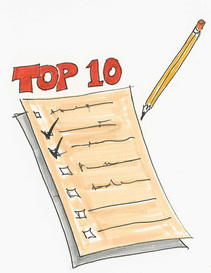
Part of me wants to say that this kind of David Letterman-style musicology is nothing but self-indulgent foolishness. And in this case, it seems especially self-indulgent, as Boulez has included himself on his own list!
But, on the other hand, in a musical world that offers a virtually infinite array of options – you can hear just about anything you want nowadays, with the click of a mouse – a listener’s own “musical centre” can get easily lost in the shuffle. Making a short-list of just ten pieces is a challenge that brings core musical values and tastes into sharp focus.
Here it is, in chronological order.
Arnold Schoenberg: Verklärte Nacht. This is a borderline case: the work’s date of completion is generally given as 1899, but it wasn’t premiered until 1902. The programmatic underpinnings are, I think, best ignored – but I love the extended melodic writing and the lush chromaticism of Schoenberg’s harmonic language. Anyone who could write like this is clearly a musical genius. (However, as for Schoenberg’s later atonal and 12-tone works, I feel inclined to quote the Vicomte de Valmont from Dangerous Liaisons: “It is often the strongest swimmers who drown.”)
Alexander Scriabin: Piano Sonata No. 9, “The Black Mass.” Composed in the magical year 1913 (as were the next two pieces on my list), this tightly woven piece is intricately organic, like a strange flower from another planet. As well, there’s a fluidity to the textures that’s the sonic equivalent of a splash of ice-cold water to the face. There’s plenty of evidence to indicate that Scriabin was stark-raving nuts: for years he laboured on a massive composition that would, he believed, induce the End of Days. But, musically speaking, he was crazy in a good way.
Sergei Prokofiev: Piano Concerto No. 2. There aren’t too many modernist piano concertos that I’d use words like “suave” and “elegant” to describe. But with this work, the words ring true. Although Prokofiev’s Second Concerto is a virtuosic showpiece, it requires a kind of sprezzatura – a seeming nonchalance that masks studied precision and careful calculation. And that’s pretty cool.
Igor Stravinsky: The Rite of Spring – because The Rite of Spring. (By the way, this is the only piece on my list that was also on Boulez’s.)
Maurice Ravel: La Valse. While there are many impressionistic works that could be on my list, I chose Ravel’s La Valse. Its ironic, twisted sense of nostalgia hits home every time I hear it. And as a study in orchestration, it’s absolutely brilliant.
Carl Ruggles: Sun Treader. This is the most “atonal” piece on my list. Ruggles once said, “In all works there should be the quality we call mysticism. All the great composers have it.” He nailed it in this grandiloquent essay for orchestra that sounds like all the forces in the universe converging in a cosmic conflict for 15 awe-inspiring minutes.
Olivier Messiaen: Quartet for the End of Time. The back-story of this piece is certainly impressive: it was written and premiered in a prisoner-of-war camp during World War II. And the piece itself is bursting with invention. This is fascinating music: stark, ethereal, joyful, diabolical, pious, introverted, extroverted, warmly human, icy cold, and more.
Francis Poulenc: Dialogues of the Carmelites. It remains a mystery to me how a composer who excelled at writing light and cheery musical gems could have written such a deeply affective (and effective) opera. But he did. And the final scene, with the nuns marching off to the guillotine, is one of the most harrowing and dramatic moments in the history of opera.
Dmitri Shostakovich: Cello Concerto No. 2. It wasn’t easy deciding which piece by this composer to put on this list. But I’ve always been fascinated by his Second Cello Concerto. It’s a late work, completed in 1966 – and contains none of the cinematic clichés that sometimes find their way into his earlier pieces. I’m always impressed by its sharply drawn lines and its starkly bright colours. And its thinness of texture is particularly effective, as there are no “pantomime moments” when the cello is swamped by the orchestra.
John Adams: Nixon in China. With Nixon, Adams created a work of sweeping, epic grandeur. It was a novel idea, back in 1987, to write an opera about contemporary political figures. But by selecting Nixon’s visit to China as their subject, Adams and librettist Alice Goodman tapped into a dormant operatic tradition of great men and women on stage, doing momentous things. Nixon in China is opera seria for the 20th century. And unlike some minimalist scores, the music doesn’t get lost inside itself.
There’s my list. And if you don’t like it, you can make your own list!
© Colin Eatock 2015
 RSS Feed
RSS Feed

